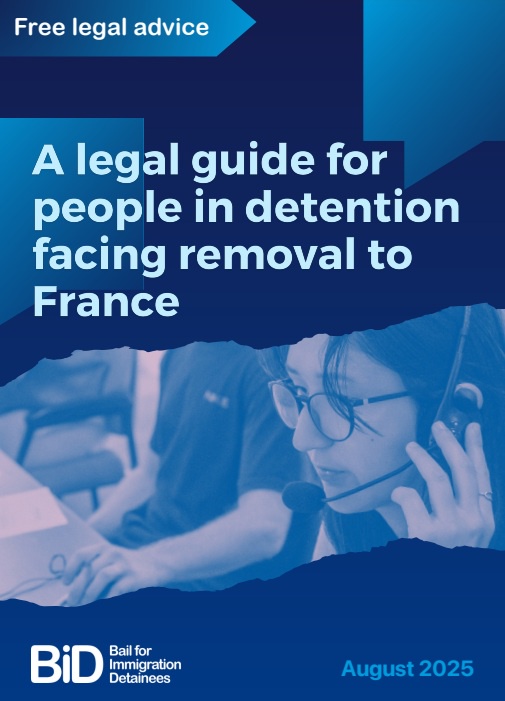Bail for Immigration Detainees (BID) has published a new legal guide for asylum seekers and migrants detained under the recently signed return agreement with France.
 You can download the 12-page guide here.
You can download the 12-page guide here.
The UK/France: Agreement on the Prevention of Dangerous Journeys came into force earlier this month and it allows the Home Office to immediately detain anyone entering the UK via a small boat. BID, which is a legal advice charity that seeks to end the use of immigration detention, said on social media that the Home Office is moving fast to detain people under the new policy.
BID’s new guide for detainees sets out what the UK–France deal involves, the rights people have, and what they can do if facing removal to France. As the guide explains, the UK–France agreement establishes specific time limits. The Home Office must make an application to France to return a person within 14 days of a their arrival in the UK, and France is expected to reply within the same period. In some cases, this can be extended to 28 days. A transfer can only take place if the individual has not lodged an asylum claim in the UK or if their claim has been ruled inadmissible. In total, the agreement sets a maximum of 42 days for these steps to be completed, within an overall process lasting up to three months from arrival.
For those detained under the agreement, a ‘Notice of Intent’ will be issued which sets out that the Government is considering returning someone to France on the basis that they entered the UK from there. BID says it has already received calls to its advice line from frightened people who have received these notices. The notice gives individuals the chance to submit reasons to the Home Office as to why they should not be removed. Although the letter states that representations must be made within seven days, people are able to request an extension if they need more time to prepare or gather evidence.
BID emphasises the need to act as quickly as possible and the guide stresses: “Responding to a Notice of Intent can be a difficult and complex area. You are strongly advised to find a lawyer as soon as possible to make submissions to the Home Office.”
The guide briefly explains how to find a lawyer and it provides a list of organisations that may be able to help. For those without a lawyer, BID provides practical steps to take independently. These include responding to the Notice of Intent within 7 days with a letter to the Home Office, requesting updates on the progress of the removal process after 14 and 28 days, and applying for release on bail from detention. Template letters are included in the guide to help people make these requests. The template letters can also be downloaded here in Word format.
BID’s guidance highlights the importance of including personal reasons for why removal to France should not go ahead, such as family ties in the UK, past experiences of torture or trafficking, or health conditions. BID advises that copies of all correspondence should be kept, along with records of when documents were submitted and any responses received.